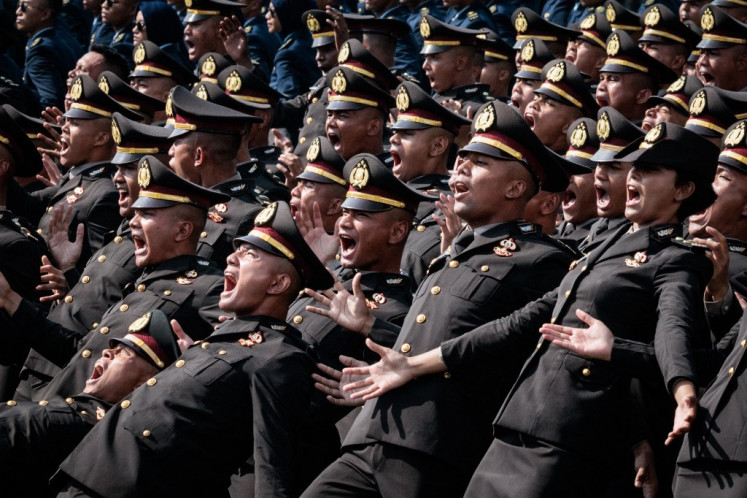Popular Reads
Top Results
Can't find what you're looking for?
View all search resultsPopular Reads
Top Results
Can't find what you're looking for?
View all search resultsBill Farmer: Career prepared me for Indonesian assignment
The time might not be right, given the recent, surprising change in Australian leadership in Canberra, but it's time for Bill Farmer, the smiling Australian Ambassador here, to go home
Change text size
Gift Premium Articles
to Anyone
T
he time might not be right, given the recent, surprising change in Australian leadership in Canberra, but it's time for Bill Farmer, the smiling Australian Ambassador here, to go home.
A number of officials and experts have expressed fear that with Farmer returning and Australia's new Prime Minister Julia Gillard, who is said to focus more on domestic issues, Australia will pay less attention to the region, including Indonesia.
But Farmer dismissed the speculation of his country's reduced focus on the region, especially Indonesia.
"You see, for any Australian government, lessening relations with Indonesia is not an option and not in our interest. Any Australian government will want to have a solid robust relationship with Indonesia," he said in an interview Thursday.
Few, if any, can deny the role Farmer has played in maintaining and bolstering Australian relations with Indonesia in his five-year term under two former prime ministers, John Howard and Kevin Rudd, with even President Susilo Bambang Yudhoyono praising him for his significant contribution recently when he met the ambassador in a farewell bid.
Farmer helped weather the storm of Australian-Indonesian relations over the years.
Just months after arriving in Jakarta, Canberra decided in early 2006 to give asylum seeker status to a number of Papuans who landed in its territory, a move that angered Jakarta, which promptly called home its ambassador in Canberra.
The moment was described by many in Indonesia and Australia as the lowest point in their relations since incidents that paved the way to Timor Leste's independence.
With recognition from both leaders that the relations of the two countries were too important to be hindered by issues, they decided to develop months later the Lombok Treaty, which swept away Indonesia's suspicion on Australia's motives with Papua.
With both countries having overcome their biggest test yet, the solution to sensitive issue after sensitive issue, including boatpeople, illegal fishing and the Bali 9, and the Balibo Five events, the quality of Farmer was clear to the Indonesian and Australian public.
But the former Australian immigration chief preferred keep a low profile, saying that 98 percent of his time was concerned with positive aspects of the two countries' relations, only 2 percent dealt with negativity, which he said logically came up from time to time because they were the products of the closeness. "I think we can now talk productively, frankly about all issues that arise. The issue is just an issue. It doesn't become the relationship."
Beside gaining respect from Indonesian officials and businesspeople for his openness and friendliness, journalists here loved him as he never turned down a door-stop interview and always answered questions.
It was, however, unimaginable five years ago when his assignment to Indonesia, one of Australia's top three diplomatic postings, was regarded by many in Australia as an escape from an accusation of the mistreatment of refugees during his tenure as immigration chief.
It was probably the lowest point in Farmer's career as a public servant at that time, although Howard defended him, saying, "He is going to Jakarta because he is a very experienced diplomat. He's had a very long and distinguished and meritorious career in the Department of Foreign Affairs and Trade and I am confident that he will do a very good job as Australia's ambassador *there*."
But five years later, it became a distant memory, and returned from his time as a successful ambassador, with almost everyone in Australia and Indonesia agreeing that now was the highest point in relations between the two countries.
"It's been quite an extraordinary experience. I've been a diplomat for 41 years, and for me to finish my career in Jakarta is an enormous privilege. I feel that my whole career had prepared me for this assignment here."
For the ambassador, the success of his mission here also depended in no small part on the support of his spouse. Speaking to Elaine Farmer, it becomes clear that his ambassadorship and successful outreach was a team effort.
As the wife of an ambassador, one expects Elaine to only express dutiful courtesies when speaking of the country where her husband is the highest-ranked representative. But even the most brief conversation would lead us to believe that her appreciation for Indonesia is more than simple pro forma.
Displaying an unusual comprehension of the country's political history and the dynamics of the present day, one genuinely believes she holds affection for the nation, which she insists will remain in the couples hearts, minds and future plans.
With the prospect of retirement awaiting their post-Indonesia life, Elaine think of the future as an adventure that she and her husband are looking forward to in which "Indonesia *will be* a key part".
So much so, she says, that "we've even left a suitcase full of clothes and other things in Yogyakarta."
Meidyatama Suryodiningrat contributes to the story.










